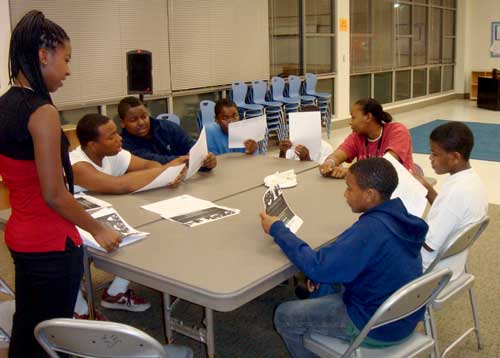Last week, the mayoral and city council elections was drawing near, local Durham youth were making sure their voices are heard.
On Thursday, Oct. 29, Durham youth ranging from elementary to high school students gathered at the Holton Career and Resource Center to ask questions to their potential community leaders. These young and active members of the community are involved in the organization “Kids Voting Durham.”

Standing: Leighane Baker and sitting from left to right: Denzel Gooch, Tariek Spires, Antonio Cylaspie, Quamaine Washington, Towanna Thomas, Deshawn Worthy and Marquette Cates brainstorm questions to ask the potential mayoral and city council candidates. (Photo by Emily Browder)
Leighane Baker, 17, one of the three teen organizational leaders at the event, said “Voting is important to me because your voice helps and contributes to what goes on around you in your community. It involves me, my friends, my family and is a way for me to voice my opinion.”
Baker first learned of the program from friend and classmate, Justin Clark, who became involved with it two years ago.
“One of the goals of “Kids Voting” and the discussion forum is to really show local youth that the decisions which are made now, affect us now,” said Clark. “Kids that are active now really have the desire to be active for the long haul.”
“Kids Voting” offers Durham students under the age of 18 the chance to vote on the same candidate and issues as adults at precinct locations and schools across Durham on Election Day. The results are then reported along with the “real” votes.
At the event on Oct. 29, the “Kids Voting” participants arrived early to break into small groups of six to eight to brainstorm their most pressing questions to ask of the candidates. Most of the questions the youth were eager to ask involved issues of police/safety, public parks/street conditions and about employment opportunities in the community.
Once the candidates arrived, they circulated around the room to each table of students to answer the questions the students had about the future of their community.
Quamaine Washington, a sixth grader from Neal Middle School, asked “Why do you have to be so old to get a job?” He also asked, “Why can’t people in bad neighborhoods get good security systems?”
Baker emphasizes that “kids are the future, and we do have a voice. I think a lot of times teenagers don’t really care and feel like they aren’t going to be heard. So why bother? But this is not true; teenagers’ opinions are important, and we can have some good things to say, which will make a difference.”
Clark said, “I believe that Kids Voting is on the verge of a shift in terms of seeing more teenagers becoming involved. I can tell that the youth in this area are starting to realize that they do have a voice and are stakeholders in the community. Even if they can’t legally vote, they can still be heard.”
“Kids Voting is slowly changing the perception that you have to be 18 to have an opinion or be able to change what is going on in government,” said Clark.